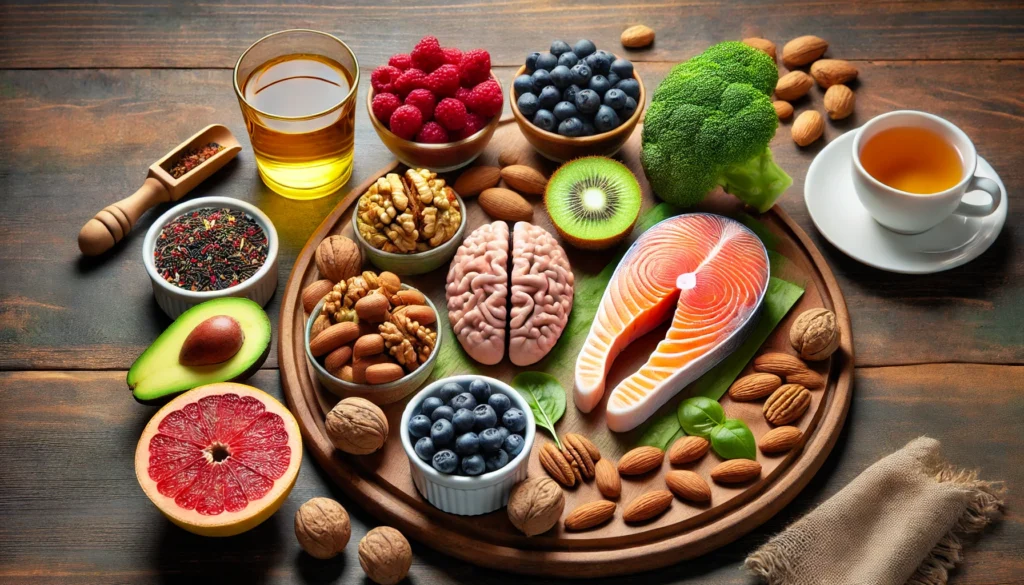In an era where cognitive demands are ever-increasing, understanding how to maintain and enhance brain health is crucial. Whether you’re a health and wellness coach, a science journalist, or a biohacker, this comprehensive guide will provide you with actionable insights into optimizing brain function and protecting neurological health. As we delve into the intricacies of brain health, we will explore essential strategies that anyone can adopt, regardless of age or background.
You may also like: Top Herbs to Enhance Your Focus
Understanding Brain Health
Brain health is a multifaceted concept that encompasses everything from maintaining cognitive function to preventing neurological disorders such as dementia. A neurologically healthy brain is one that can perform all mental processes needed for everyday life, from memory and learning to reasoning and decision-making. It involves an intricate balance of various factors, including lifestyle, genetics, and environmental influences.
The Complexity of Brain Function
The brain is a complex organ that operates through a network of neurons communicating via electrical signals. This intricate system requires a variety of nutrients and environmental stimuli to maintain its functionality. Understanding the basics of how the brain works can help us appreciate the importance of nurturing it with the right tools and habits.
The Importance of Brain Health
As we age, maintaining brain health becomes increasingly vital. Cognitive decline and conditions like dementia are common concerns, especially for seniors. Protecting your brain from damage involves a combination of lifestyle choices, dietary habits, and mental exercises. Beyond aging, everyday stressors and lifestyle choices can significantly impact cognitive health, making proactive brain health maintenance a priority at any age.
Factors Influencing Brain Health
Numerous factors contribute to brain health, including genetics, lifestyle, and environmental elements. While we can’t control our genetic makeup, we can make informed choices about our environment and lifestyle. Regular assessments of these factors can help tailor a personalized approach to maintaining and enhancing cognitive function, ensuring that the brain remains agile and resilient.
Best Practices for Enhancing Brain Health
Enhancing brain health requires a multifaceted approach that combines nutrition, physical activity, mental stimulation, and social engagement. Each aspect plays a significant role in supporting cognitive function and overall brain health. By integrating these practices into your daily routine, you can create a robust foundation for cognitive longevity.
Nutrition: Feeding Your Brain
A balanced diet is essential for brain health. Omega-3 fatty acids, found in fish, walnuts, and flaxseeds, are known to support cognitive function and reduce inflammation. Antioxidants, abundant in berries and leafy greens, combat oxidative stress, which is linked to neurodegeneration. Proper nutrition not only fuels the brain but also provides the building blocks necessary for repairing and growing new neural connections.
Key Nutrients for Brain Health
Certain nutrients have been identified as particularly beneficial for cognitive function. These include B vitamins, vitamin E, and choline, which support neurotransmitter production and brain cell maintenance. Incorporating a variety of these nutrients through diverse food sources can help ensure comprehensive nourishment for the brain.
The Role of Hydration
Staying hydrated is crucial for maintaining optimal brain function. Dehydration can impair concentration, reduce cognitive performance, and affect mood. Drinking adequate water and consuming water-rich foods can help maintain the necessary fluid balance in the brain, promoting better cognitive health.
Mindful Eating Practices
Mindful eating involves paying attention to the food we consume and how it affects our body and mind. This practice encourages healthier food choices and fosters a deeper connection to the nutrients we ingest. By being mindful of our eating habits, we can better support brain health through intentional dietary decisions.
Foods for Brain Health
- Fatty Fish: Rich in omega-3s, which are essential for brain function. These healthy fats help build cell membranes in the brain and have anti-inflammatory effects.
- Blueberries: Packed with antioxidants that may delay brain aging and improve memory. Their high flavonoid content is linked to better cognitive performance.
- Turmeric: Contains curcumin, which has anti-inflammatory and antioxidant benefits. Curcumin has been shown to cross the blood-brain barrier, which may help reduce the risk of neurological diseases.
Exercise: A Boost for Brain and Body
Physical activity is not just beneficial for your body; it’s a powerhouse for your brain as well. Regular exercise increases blood flow to the brain and promotes the release of hormones that enhance brain cell growth and function. Exercise can also improve mood and reduce stress, both of which are essential for maintaining cognitive health.
Types of Exercise for Brain Health
Different types of physical activity can provide varying benefits for brain health. Aerobic exercises, such as running and swimming, enhance cardiovascular health, which supports brain function. Strength training and flexibility exercises can also contribute to improved brain health by reducing the risk of injury and enhancing overall physical well-being.
Exercise and Neuroplasticity
Exercise has been shown to promote neuroplasticity, the brain’s ability to form new neural connections. This adaptability is crucial for learning and memory. Regular physical activity can help preserve cognitive function by encouraging the brain to adapt and remain flexible even in the face of aging or injury.
Incorporating Movement into Daily Life
Incorporating regular movement into your daily routine doesn’t have to be challenging. Simple activities like walking, cycling, or even gardening can provide significant benefits for brain health. The key is consistency and finding enjoyable activities that keep you moving regularly.
Mental Stimulation: Keeping Your Mind Active
Engaging in mental exercises is a proven strategy to enhance cognitive function. Activities such as puzzles, reading, and learning new skills stimulate brain plasticity, the brain’s ability to reorganize itself by forming new neural connections. Keeping the mind active is essential for maintaining cognitive agility and preventing decline.
Creative Pursuits and Cognitive Function
Engaging in creative activities like painting, writing, or playing an instrument can have profound effects on brain health. These activities stimulate different areas of the brain, enhancing problem-solving skills and promoting emotional well-being. Creative pursuits can offer both mental stimulation and emotional satisfaction, contributing to overall cognitive health.
Lifelong Learning and Brain Health
Continuous learning is a powerful tool for maintaining and enhancing brain health. Whether through formal education or self-directed study, learning new skills and concepts challenges the brain and encourages cognitive growth. Lifelong learning can provide a sense of purpose and keep the mind sharp well into older age.
Digital Tools for Mental Stimulation
Technology offers numerous opportunities for mental stimulation. Brain training apps, online courses, and digital puzzles can provide convenient ways to challenge the brain regularly. While not a replacement for real-world activities, these tools can supplement traditional methods of cognitive engagement.

Tips for Mental Stimulation
- Learn a New Language: It challenges the brain and improves memory. The complexity of language acquisition stimulates various cognitive processes.
- Play Strategy Games: Games like chess encourage strategic thinking and problem-solving. They require planning, foresight, and adaptability, which are beneficial for cognitive health.
- Puzzles and Crosswords: These classic activities are great for keeping the mind sharp. They promote logical thinking and can be a fun way to challenge the brain daily.
Social Interaction: The Emotional Brain
Social engagement is a key component of brain health, particularly for seniors. Interacting with others can prevent feelings of loneliness and depression, which are associated with cognitive decline. Maintaining strong social connections can enhance emotional well-being and provide cognitive stimulation.
The Impact of Social Networks
Having a strong social network can provide emotional support and cognitive benefits. Regular interaction with friends and family encourages mental engagement and provides opportunities for learning and sharing experiences. Social networks also offer a sense of belonging and purpose, which are crucial for emotional health.
Volunteering and Community Involvement
Volunteering and participating in community activities can offer significant benefits for brain health. These activities provide opportunities for social interaction, skill development, and a sense of accomplishment. Engaging with the community can enhance cognitive function and emotional well-being by fostering a sense of connection and purpose.
Technology and Social Connectivity
In today’s digital age, technology can play a role in maintaining social connections. Video calls, social media, and online communities can help bridge geographical gaps and keep individuals connected. While not a substitute for in-person interaction, digital communication can supplement traditional social engagement.
Protecting Your Brain from Damage
Protecting the brain from damage involves adopting habits that reduce the risk of cognitive decline and neurological disorders. By understanding the factors that contribute to brain health deterioration, we can take proactive steps to safeguard our cognitive function.
Sleep: The Brain’s Reset Button
Quality sleep is fundamental for cognitive function and emotional well-being. During sleep, the brain eliminates toxins, consolidates memories, and repairs itself. Aim for 7-9 hours of quality sleep per night to ensure optimal brain function. Establishing a consistent sleep routine can significantly impact cognitive health by providing the brain with the rest it needs to perform optimally.
Sleep Hygiene Practices
Practicing good sleep hygiene can enhance the quality of sleep and support brain health. This includes creating a comfortable sleep environment, limiting screen time before bed, and maintaining a regular sleep schedule. By prioritizing sleep hygiene, you can improve both the quantity and quality of your sleep.
The Role of Sleep Cycles
Understanding the stages of sleep can help optimize rest and recovery. Each sleep cycle consists of different stages, including light sleep, deep sleep, and REM sleep, all of which play a role in cognitive health. Ensuring that you cycle through these stages uninterrupted can enhance memory consolidation and emotional regulation.
The Impact of Sleep Disorders
Sleep disorders, such as insomnia or sleep apnea, can have detrimental effects on brain health. These conditions can interfere with the restorative processes that occur during sleep, leading to cognitive impairments. Seeking medical advice and treatment for sleep disorders can help protect brain health and improve overall well-being.
Stress Management: Calming the Mind
Chronic stress can have detrimental effects on brain health, leading to memory problems and reduced cognitive function. Techniques such as meditation, yoga, and deep breathing exercises can help manage stress and protect brain health. By learning to effectively manage stress, you can mitigate its impact on cognitive function and emotional well-being.
Mindfulness and Meditation
Mindfulness and meditation practices have been shown to reduce stress and enhance brain health. These techniques encourage present-moment awareness and promote relaxation, which can improve cognitive function and emotional resilience. Incorporating regular mindfulness practices into your routine can provide long-term benefits for brain health.
Physical Activity and Stress Reduction
Physical activity is a powerful tool for stress management. Exercise releases endorphins, which act as natural mood lifters, and helps reduce stress hormones. By incorporating regular physical activity into your routine, you can improve both physical and mental health, creating a positive feedback loop for cognitive well-being.
Cognitive Behavioral Strategies
Cognitive behavioral strategies can help manage stress by changing negative thought patterns. These techniques focus on identifying and altering unhelpful thoughts and behaviors, promoting healthier coping mechanisms. By addressing stress at its cognitive roots, you can enhance emotional resilience and protect brain health.
Brain Health for Seniors
As we age, the brain undergoes changes that can affect cognitive function. However, adopting a healthy lifestyle can slow down these changes and maintain brain health. By focusing on key areas of wellness, seniors can enhance their cognitive function and enjoy a higher quality of life.
Preventing Dementia
Dementia is a significant concern for the elderly population. While there is no cure, certain lifestyle changes can help prevent or delay its onset. These include maintaining a healthy diet, regular physical activity, mental stimulation, and social interaction. By adopting a proactive approach to brain health, seniors can reduce their risk of developing dementia and maintain independence.
Early Detection and Intervention
Early detection of cognitive decline can lead to more effective interventions. Regular cognitive assessments can help identify early signs of dementia, allowing for timely action. By seeking professional evaluation and support, seniors can explore strategies to slow cognitive decline and maintain brain health.

Lifestyle Interventions
Lifestyle interventions play a crucial role in preventing dementia. These include maintaining a balanced diet, engaging in regular physical activity, and prioritizing social connections. By adopting these habits, seniors can create a supportive environment for cognitive health and reduce the risk of cognitive decline.
Family and Caregiver Support
Family members and caregivers play a vital role in supporting seniors’ brain health. Providing emotional support, encouragement, and assistance with daily activities can enhance quality of life and cognitive function. Collaboration between seniors and their support networks can create a nurturing environment for brain health.
Supplements and Nootropics
For those looking to boost brain health further, certain supplements and nootropics have shown promise. Compounds like Ginkgo Biloba, Bacopa Monnieri, and Rhodiola Rosea are popular among biohackers for their potential cognitive-enhancing effects. While not a substitute for a healthy lifestyle, these supplements can complement other brain health strategies.
Evaluating Supplement Efficacy
When considering supplements for brain health, it’s essential to evaluate their efficacy and safety. Scientific research and clinical trials can provide insights into the potential benefits and risks of various compounds. Consulting with healthcare professionals can help determine which supplements may be appropriate for individual needs.
Natural vs. Synthetic Nootropics
Nootropics can be classified as natural or synthetic, each with distinct properties and potential effects. Natural nootropics are derived from plants and herbs, while synthetic nootropics are lab-created compounds. Understanding the differences between these options can help individuals make informed decisions about their brain health regimen.
Personalized Supplementation Strategies
Personalized supplementation strategies take into account individual health needs and goals. Factors such as age, lifestyle, and existing health conditions can influence the effectiveness of supplements. By tailoring supplementation to personal circumstances, individuals can optimize their approach to brain health enhancement.
Future Implications in Brain Health
The field of brain health is constantly evolving, with ongoing research uncovering new insights into how we can protect and enhance our cognitive function. Emerging technologies and therapies hold promise for even more effective ways to maintain brain health in the future. By staying informed about these developments, individuals can anticipate and adapt to new opportunities for brain health optimization.
The Role of Technology
Technological advancements are opening new avenues for brain health. From brain training apps to wearable devices that monitor cognitive function, technology is becoming an integral part of maintaining and enhancing brain health. These tools offer new possibilities for personalized and accessible brain health support.
Brain-Computer Interfaces
Brain-computer interfaces (BCIs) represent a cutting-edge area of research with potential applications for brain health. BCIs can facilitate direct communication between the brain and external devices, offering innovative ways to monitor and enhance cognitive function. While still in developmental stages, these technologies may revolutionize the way we approach brain health.
Virtual Reality and Cognitive Rehabilitation
Virtual reality (VR) is being explored as a tool for cognitive rehabilitation and enhancement. VR environments can simulate real-life scenarios, providing immersive experiences that challenge cognitive skills. This technology has the potential to support brain health by offering engaging and effective cognitive training.
Data-Driven Health Insights
Advances in data analytics are enabling more precise insights into brain health. Wearable devices and digital health platforms can collect and analyze data on cognitive function, providing valuable information for personalized health strategies. By leveraging data-driven insights, individuals can make informed decisions about their brain health.
Personalized Brain Health Strategies
With the rise of personalized medicine, brain health strategies are becoming more tailored to individual needs. Genetic testing and personalized nutrition plans are just a few examples of how personalization is shaping the future of brain health. By embracing personalized approaches, individuals can optimize their cognitive function and overall brain health.
Genetic Testing and Cognitive Health
Genetic testing can provide insights into an individual’s predisposition to certain cognitive conditions. This information can guide personalized prevention and intervention strategies, allowing for more targeted brain health support. As genetic testing becomes more accessible, individuals can take proactive steps to protect their cognitive health.
Personalized Nutrition for Brain Health
Personalized nutrition plans take into account individual dietary needs and preferences to support brain health. By analyzing genetic, biochemical, and lifestyle factors, personalized nutrition can optimize nutrient intake and promote cognitive function. This approach offers a tailored solution for enhancing brain health through diet.
Customized Cognitive Training
Customized cognitive training programs can address specific cognitive strengths and weaknesses. By tailoring exercises and activities to individual needs, these programs offer targeted support for cognitive enhancement. As personalized cognitive training becomes more refined, individuals can achieve more effective and lasting improvements in brain health.

Conclusion
Boosting brain health requires a holistic approach that encompasses nutrition, exercise, mental stimulation, and social interaction. By adopting these strategies, you can protect your brain from damage, enhance cognitive function, and maintain neurological health throughout your life. As research continues to evolve, staying informed about the latest trends and developments will be crucial in optimizing brain health. Whether you are guiding clients, writing articles, or seeking to enhance your own cognitive abilities, these tips and tricks offer a solid foundation for promoting a neurologically healthy lifestyle. By embracing a comprehensive approach to brain health, you can foster cognitive resilience and enjoy enhanced mental well-being throughout your life.
Further Reading:
Improve Your Brain Health with a New Brain Care Score
Physical Activity Boosts Brain Health
Important Note: The information contained in this article is for general informational purposes only, and should not be construed as health or medical advice, nor is it intended to diagnose, prevent, treat, or cure any disease or health condition. Before embarking on any diet, fitness regimen, or program of nutritional supplementation, it is advisable to consult your healthcare professional in order to determine its safety and probable efficacy in terms of your individual state of health.
Regarding Nutritional Supplements Or Other Non-Prescription Health Products: If any nutritional supplements or other non-prescription health products are mentioned in the foregoing article, any claims or statements made about them have not been evaluated by the U.S. Food and Drug Administration, and such nutritional supplements or other health products are not intended to diagnose, treat, cure, or prevent any disease.


